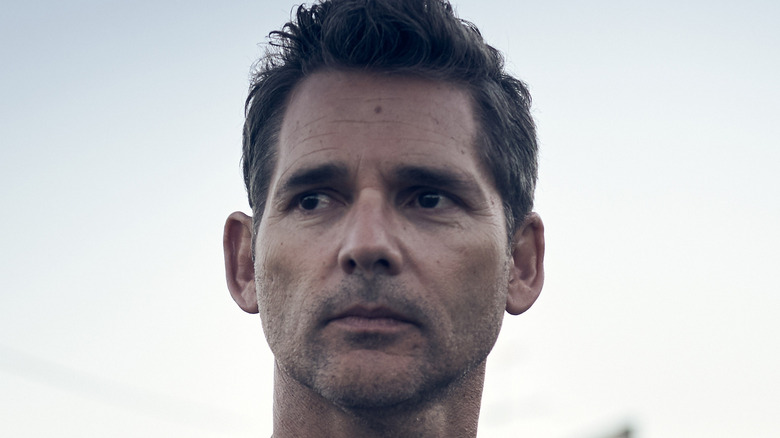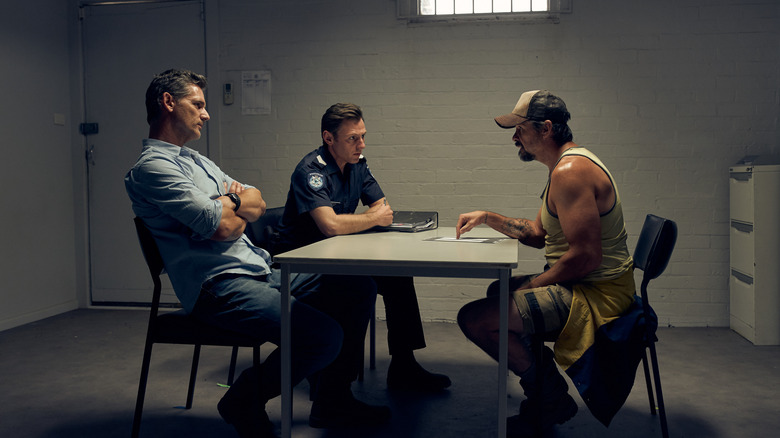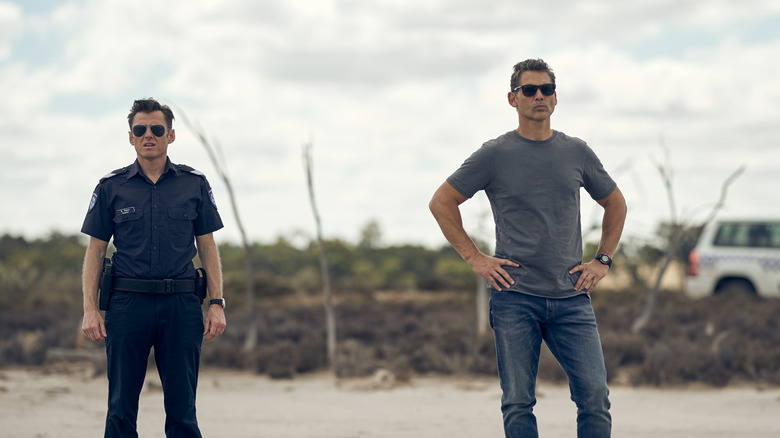The Dry Review: A Different Kind Of Noir
For most detective-driven mystery films, the pursuit of a killer provides enough intrigue and forward momentum to carry a picture from its opening scene to its closing credits. But in Robert Connolly's "The Dry," his new Aussie neo-noir starring Eric Bana, the case at hand feels beside the point. The film functions just fine as a procedural, but its well-worn framework as a detective story is repurposed to form the backbone of a smoldering exploration of guilt's traumatizing power. It's the sort of film where finally finding out the identity of the killer feels like an afterthought in the wake of the film's other considerable and haunting revelations.
The film, based on the Jane Harper novel of the same name, follows Bana as Aaron Falk, a federal agent whose childhood friend Luke has allegedly murdered his own family before committing suicide. Luke's parents convince Falk to return to his hometown of Kiewarra for the first time in 20 years to find out whether his friend is really responsible for this atrocity that has impacted their community harder than the last big tragedy — the same tragedy that drove Falk away from his home in the first place.
In unpacking this heinous crime, Falk must engage with a populace who continue to harass him for his perceived involvement in the death of Ellie Deacon, an incident for which Falk's only alibi rested with Luke. As much as "The Dry" is about getting to the bottom of Luke's death, it is also an opportunity for Falk to retrace the buried memories surrounding Ellie's.
Just one more thing...
From the film's opening moments, abstracting the grisly nature of the inciting events to little more than drifting vignettes through the scene of the crime scored by the howling of Luke's surviving baby, "The Dry" finds its dramatic power in what it leaves to the imagination. It's a tense, terse and, well, dry picture whose style is as threadbare as its locale is barren — a slow burn that weaponizes its non-linear narrative so the present blends with the past in the viewer's mind as frustratingly as it does in Falk's.
Falk teams up with local sheriff Greg Raco (Keir O'Donnell), retracing the initial investigation's steps from an outsider's perspective. But at every single turn, Falk runs into suspects, witnesses and persons of interest who all sneer at him with knowing derision, each of them so certain they know what happened to Ellie Deacon in the past, even though both the film's coy pacing and Bana's stellar performance imply events couldn't be as cut and dried as the town gossip suggests.
It's hard enough when Falk has to conduct his fact-finding mission with relative strangers who think they know him well, but it's even worse when he crosses paths with the folks who truly do, like Gretchen (Genevieve O'Reilly), a former flame of Luke's whose very presence complicates matters. In the noir vernacular, Gretchen fills a similar role, structurally speaking, to the archetypical femme fatale figure. But she's less of a duplicitous temptress than an omnipresent reminder of a time in Falk's life that plagues this entire case.
If the film's central mystery has a failing, it's in how the uncertainty of Falk's past has a gravitational pull that diminishes the tension regarding the task at hand. The more breadcrumbs left to the viewer in the flashbacks or the passing chatter of present-day interrogations, the harder it is to keep track of the likely suspects or to parse red herrings. Put simply, the audience wants to know what happened to Ellie Deacon more than it cares whether or not Luke killed his wife and son.
Much of this is because of the fascinating way Bana chooses to play Falk. Bana possesses a rock-solid screen presence, compelling as a white knight but equally believable as someone capable of far worse. The open, honest nature of his face gives the impression he couldn't have killed anyone, but the significant guilt he's carrying around suggests he knows more about what happened to Ellie than he ever let on to his neighbors, or even his own father.
This unintentional imbalance makes some passages in the film's runtime move slower than others. It becomes easy to tune out or get distracted when a new puzzle piece in Luke's case is presented, only to snap back to focus in the more vivid and engaging excavation of Ellie's untimely end.
A prodigal son returns...
While the third act revelations about whether Luke really killed his family prove sound, believable, and a satisfying conclusion for the mystery at hand, the who and the how prove less illuminating than the why. In unpacking the complex web of desperation at the heart of the crime, the portrait "The Dry" has been painting this whole time comes into sharper focus.
The film's title, for instance, seems to be an allusion to the river they found Ellie Deacon in all those years ago. When Falk returns home, it's just a winding hollow of dirt and dust, a gaping maw staring back at him with ill intent. It just as easily describes this whole town, full of hard-living, hard-luck people for whom ostracizing others becomes too easy a salve for their own indiscretions. Every pointed finger in Kiewarra protrudes from the hands of someone hoping to deflect their own guilt with the inherent power of the accuser. There's no need to wrestle with your own demons if there's someone across the bar who's done worse.
So after Luke's mystery is resolved and Falk finally pieces together the truth of Ellie's fate, the reveals pale in comparison to the collective, self-flagellating ruin that haunts everyone else involved. The film suggests that a life taken shuffles from this mortal coil slowly, over the course of years. Murder is a singular transgression, yes, but it's the death of a thousand cuts leading to that final act that makes "The Dry" such a harrowing watch.
The average whodunit gives the viewer some measure of reassurance. It's a genre that calms the nerves by setting some injustice in order, by finding peace in the answer to a difficult question. But the patient, probing methodology director Connolly employs in bringing Harper's novel to the screen is far more disquieting than that.
Finding the identity of the monster who stole a loved one from you is a meaningless balm when weighed against the certainty that you failed them in more tragic and bruising ways before they could meet that final fate. While the detective in stories like this is generally responsible for providing catharsis for the survivors, here Falk answers a pair of disturbing questions, about his past and his present, with conclusions insufficient to bring any kind of comfort to those involved.
"The Dry" is a film that builds, ever so patiently, to dark and ruinous truths, the kind that stick with you far past the final fade to black.


